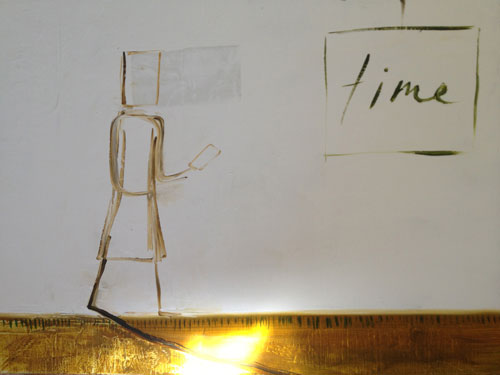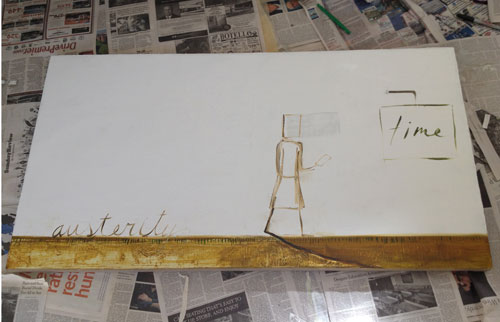Early August brings the first night I hear a few crickets, a melancholy sound because it means both deep summer and the coming of fall. In the studio, things both speed up and slow down, for me there is always a pressure to finish as much work as possible while I have undisturbed studio time, like a squirrel storing acorns, and there is a slowing down when I feel imperceptibly in a productive groove.
August 10, 1976

August 10, 2013
In the morning the sun rakes a painting worked on the day before.

In the painting two words frame the moment: “austerity” and “time.” These days in the studio are the ones I long for most of the year, when time appears for fractions of a second to slow down, when a moment of clarity allows for a space of enjoyment of perception, if only that of a hummingbird at rest. It doesn’t last, but for a moment “time” puts on its expansive, positive face, rather than the one we live with where it speeds past without respite or experience.
I am reading Jonathan Crary’s 24/7: Late Capitalism and The Ends of Sleep. Crary posits that the human need for sleep is a waste of the time of the 24/7 featureless economy of late capitalism: sleep is the last atavistic vestige of a contingent humanity that must be suborned, eroded, the need for it eradicated if possible, so that humans can keep up with the always on mode of global production, information, and consumption. He describes the needs of a “contemporary imaginary in which a state of permanent illumination is inseparable from the non-stop operation of global exchange and circulation, ” where “24/7 is a static redundancy that disavows its relation to the rhythmic and periodic textures of human life…a time of indifference, against which the fragility of human life is increasingly inadequate and within which sleep has no necessity or inevitability.” Crary writes,
Sleep is an uncompromising interruption of the theft of time from us by capitalism. Most of the seemingly irreducible necessities of human life–hunger, thirst, sexual desire, and recently the need for friendship–have been remade into commodified or financialized forms. Sleep poses the idea of a human need and interval of time that cannot be colonized and harnessed to a massive engine of profitability, and thus remains an incongruous anomaly and site of crisis in the global present. In spite of all the scientific research in this area, it frustrates and confounds any strategies to exploit or reshape it. The stunning, inconceivable reality is that nothing of value can be extracted from it.
Even in a pastoral retreat, my figure cannot relinquish her hold on the always turned on iPhone, whose blue light addictively disrupts sleep. The figure and “time” are small rooted elements in a field of white, marked only by “austerity.” It is hard for anything to grow in a field of austerity, our time now, here in America, where things on the surface look normal or so we are led to believe, but where in fact for most people there is less oxygen in the air, less space to move in, less potential of time.

